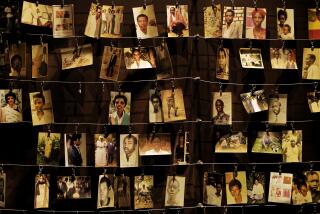Our friend, an architect of the genocide in Darfur
IT HAS BEEN 18 months since the United States concluded that genocide was taking place in Darfur. Yet President Bush, the only president to declare an ongoing genocide since the term was coined 50 years ago, has done little to stop this crime against humanity.
Why not? The answer may lie in the complex story of Salah Abdallah Gosh. Gosh isn’t exactly a household name, but there are two groups of people for whom his name is exceedingly important: U.S. counterterrorism officials and victims of atrocities in Sudan.
For the record:
12:00 a.m. Feb. 15, 2006 For The Record
Los Angeles Times Wednesday February 15, 2006 Home Edition California Part B Page 13 Editorial Pages Desk 0 inches; 30 words Type of Material: Correction
Sudan: A Feb. 13 article about Darfur said the term “genocide” was coined 50 years ago. The term first appeared in Raphael Lemkin’s 1944 book, “Axis Rule in Occupied Europe.”
Throughout his career, Gosh has specialized in undertaking spectacular missions beneath the radar screen. From 1990 to 1996, he was Osama bin Laden’s main escort while the Al Qaeda leader lived in Sudan, helping him incubate the commercial infrastructure that would finance future terrorist strikes. From 2003 on, he helped plan, organize and execute the vicious counterinsurgency campaign in Darfur in his position as chief of Sudan’s security agency.
Such a resume should have put Gosh on trial for terrorism or war crimes. Instead, the CIA has made him one of its favored interlocutors on terrorism, according to U.S. officials, even flying him by private jet to Virginia for a debriefing last year. Further, the United States has pressed the United Nations not to include Gosh on the list of people who should be subject to sanctions, with the expectation that Gosh will continue to provide information about Al Qaeda suspects. Gosh boasted to the L.A. Times last year that Sudan has “a strong partnership with the CIA. The information we have provided has been very useful to the United States.”
Counterterrorism exigencies have understandably replaced Cold War calculations as the dominant paradigm for U.S. foreign policy. The moral quandary is omnipresent: Should you make deals with smaller devils to get to the bigger ones? Just as detectives on the street interact with all manner of miscreants to build a case, so too must today’s terrorism fighters. But Gosh’s sins are too serious to ignore, and they present three stark dilemmas for U.S. policymakers.
First, should someone who masterminded the policy of arming the infamous janjaweed militias to burn the villages of non-Arab ethnic groups be feted and protected by the CIA? At least 200,000 people have been killed and at least 2 million displaced in Darfur in a struggle between the government and rebel groups. There are plenty of canaries out there ready to sing. Gosh should not be allowed to be one of them.
Second, Gosh’s story calls into question the U.S. policy of offering incentives, such as the lifting of sanctions, to mass murderers. Although the U.S. has pledged better relations with Sudan, it has been sticks, not carrots, that have produced real movement. The Sudanese government intensified its cooperation on counterterrorism twice in the last decade. The first time was in response to being sanctioned by the U.N. Security Council for facilitating the attempted 1995 assassination of President Hosni Mubarak of Egypt. The second was in the aftermath of 9/11, when there was a credible threat of U.S. military action against the Khartoum regime over its support of terrorism.
Third, Gosh’s story highlights the limitations of a counterterrorism policy that sacrifices other critical foreign policy objectives. It is in the interest of the U.S. to do all it can to oppose a regime conducting what Bush has called genocide. But the U.S. has not stood up to Khartoum or taken the lead in deploying a multinational force capable of protecting civilians in Darfur from further rape, murder and starvation.
The African Union force now on duty, with its inadequate troop levels and mandate, should be rehatted as a U.N. mission, with double the forces and a protection mandate. The U.S. has to lead the diplomacy in the U.N. -- especially with China and Russia. And the Europeans must pony up more money.
Gosh is the tip of the iceberg of a disturbing policy that undermines U.S. moral leadership in exchange for drivels of information that could be had simply by squeezing Khartoum harder. How many more Darfurian lives must be sacrificed on the altar of expediency?
More to Read
Sign up for Essential California
The most important California stories and recommendations in your inbox every morning.
You may occasionally receive promotional content from the Los Angeles Times.










